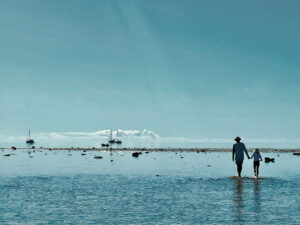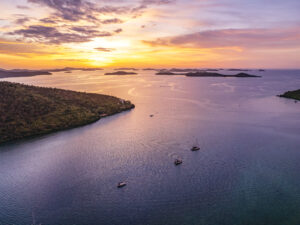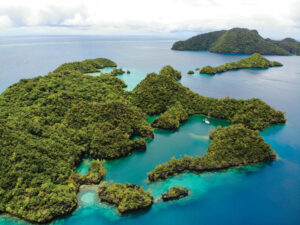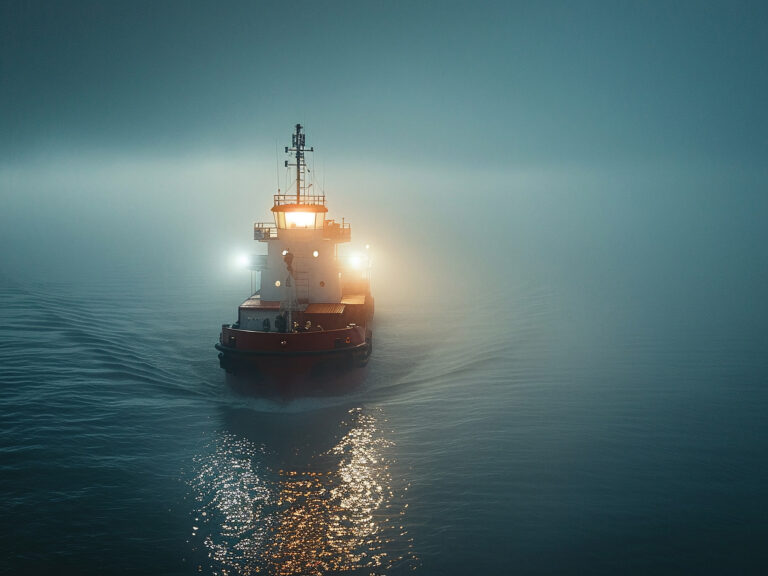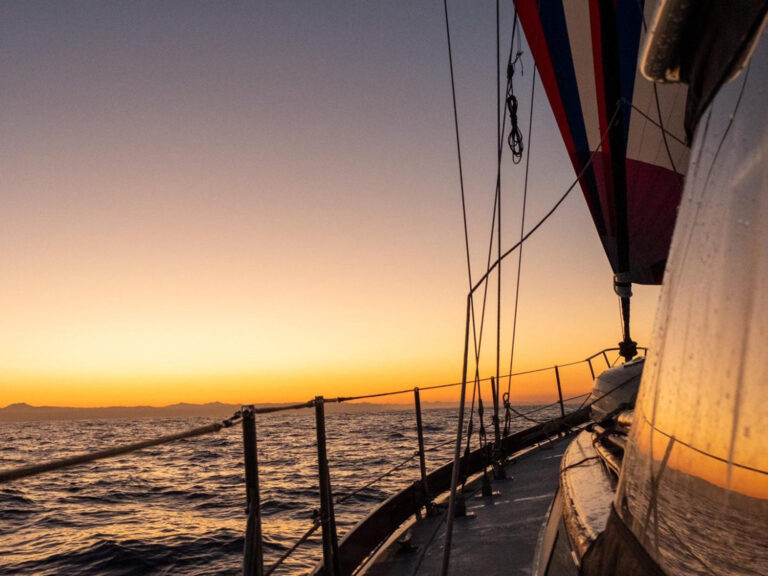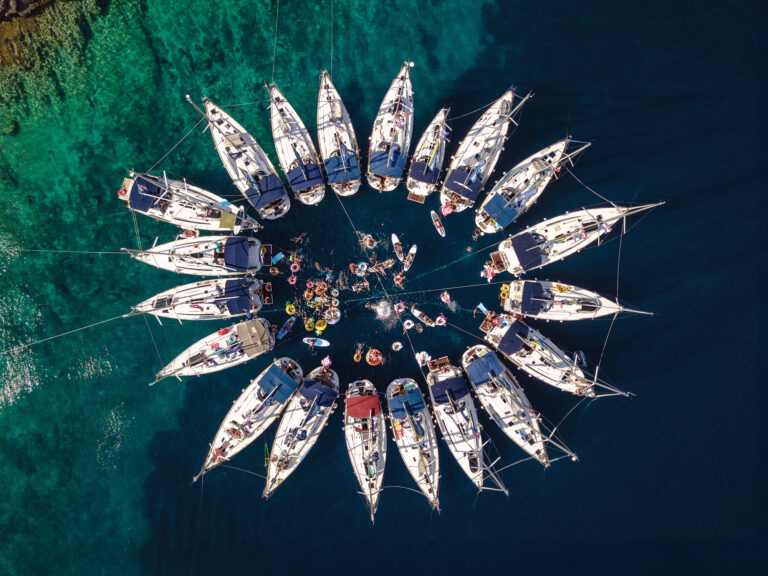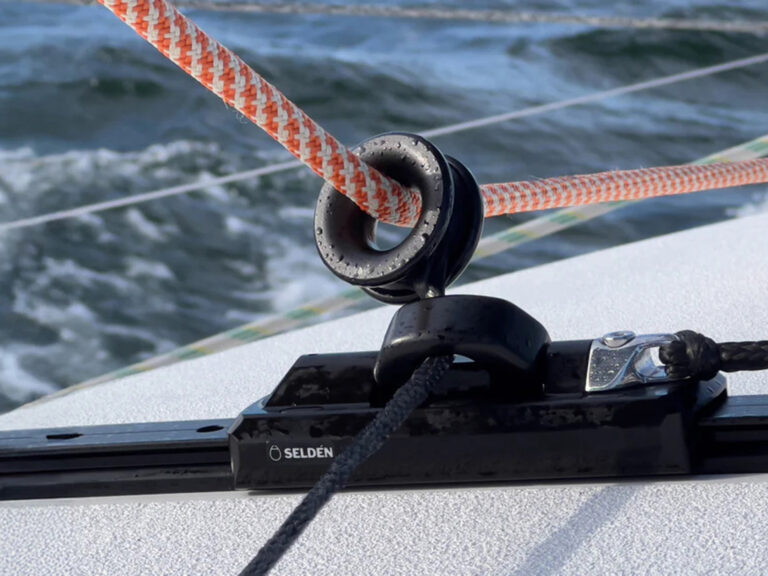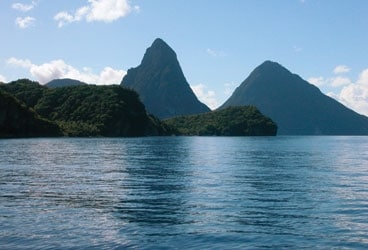
Precautions in Paradise
The ironic thing about the burglary was that right up to the moment they became random victims, it’d been the best night of their trip. They were a party of six experienced sailors who’d bolted for the Caribbean from New England in late autumn for a taste of the islands before winter closed in. Aboard their chartered 46-foot catamaran, they’d stopped for an evening just north of St. Lucia’s Petit Piton, where they swam and snorkeled and enjoyed a dinner of fresh tuna, which they’d purchased from one of the ubiquitous boat boys who ply the local waters. Afterward, they sprawled out on the forward trampoline and soaked in the miracle of the evening sky, relishing one another’s company and their shared good fortune. It was great to be with friends in such a marvelous setting.
Later, the skipper awoke to check the mooring when the wind shifted in the wee hours. All was well, there was nothing unusual, and he went back to bed. Morning brought a new, ugly reality. Sometime before dawn, while everyone slept, someone had shinnied through a narrow hatch in the forward saloon and made off with a pair of cellphones and a couple of cameras and emptied the cash from a wallet, which was left behind.
In many ways, the captain, a friend of mine who works in the marine sector and wishes to remain anonymous, and his crew were very lucky. There’d been no confrontation. No one was hurt. The stolen stuff could be replaced. But the truth is that what had started out as a most memorable evening will always remain so. Just for all of the wrong reasons.
The Tipping Point
Malcolm Gladwell’s excellent book, The Tipping Point, is an examination of what he describes as “social epidemics,” when a seemingly small-scale or isolated event triggers a series of related incidents or acts that ultimately effect great change. When it comes to crime against cruisers in the Caribbean-or, perhaps, the overall perception of crime in the islands-the tipping point occurred aboard the yacht Aquarius on June 18, 2006, in St. Lucia’s Rodney Bay.
That night, three men boarded the boat, awoke its married crew-a Dutchman and a French woman-and wreaked what can only be described as hellish, felonious havoc. They beat the skipper to a pulp, raped his wife at knifepoint, and made off with jewelry, electronics, and money. The guilty men were apprehended and jailed in notable, commendable short order, but the repercussions of their heinous misdeeds resonated through the maritime community, and in many ways the aftermath of the attack took on a life of its own.
“Communications are so much more advanced than they used to be,” says Melodye Pompa, an American cruiser who’s been the net controller since 1999 for the Carriacou-based Caribbean Safety and Security Net. According to Pompa, the Aquarius story quickly spread via the cruising grapevine, and soon after, “the government of St. Lucia received a slew of e-mails about it.” That was only the beginning. There was, she says, a vigorous grassroots attempt to persuade the organizers of the Atlantic Rally for Cruisers to cut ties with St. Lucia and Rodney Bay, and though that effort was unsuccessful, the movement to make Caribbean lawmakers aware of and accountable for the swelling outrage was not.
“[The news] went around the world so fast,” Pompa says. “The St. Lucian government had to respond very, very quickly to manage all that dissatisfaction.”
In fact, though the Aquarius affair tipped the crime issue onto the figurative radar screens of scores of voyagers, in a broader sense it probably wouldn’t have gained so much traction, and so quickly, had it not been accompanied by three other major, though unrelated, incidents in 2006: the boarding and armed robbery of three charter boats in the southern Grenadines in April; the assault and rape of a visiting mother and two daughters on a trek up the volcano on St. Vincent in June; and a rash of thefts, followed by an armed robbery, in Trinidad in August. Along with the petty sorts of criminal activity that had been on the upswing in recent years, suddenly there was an outright spree of serious crime, and there was no way that the region’s politicians could ignore it.
The response was swift, at least by island time; it was also, not surprisingly, political. In October 2006, the respective ministers of tourism for the nine-nation Organization of Eastern Caribbean States called for a “yacht-crime summit” that convened in St. Lucia two months later. The motives of member nations, which represent islands throughout the Caribbean, included shared economic interests: As a revenue stream, yachting reportedly contributes more than $170 million to the region’s coffers on an annual basis, and it was obviously in the respective governments’ best interests to make a show of action and solidarity. Law-enforcement officials from eight countries were in attendance, as was Melodye Pompa and a handful of other cruisers.
Plans were hatched; promises were made. “I think the message about how they need to work together got through,” says Pompa. “There was a good response. Unfortunately, we’ve seen nothing from the OECS itself or from any of the member states since that meeting took place. [From] local tourist boards and businesses, yes, but nothing from any of the governments in an official sense.”
The genie, however, was out of the bottle. Caribbean Compass, the monthly cruising newspaper, followed up with a relevant series of reports and letters, many of which are archived on its website (www.caribbe ancompass.com). Soundings, a U.S. nautical magazine, ran a solidly reported cover story with the timely, if slightly obvious and sensational tagline, “Real-life pirates of the Caribbean.”
Even venerable Caribbean sailor Don Street chimed in, with a January 2007 opinion piece in the Compass outlining the places he’d avoid to ensure his safety while under way. To one degree or another, the usual suspects were noted: Venezuela, Trinidad, the west coast of St. Vincent, and certain parts of St. Lucia.
Regarding the citizenry of the Caribbean, Street wrote that, like Ivory Soap, “99 and 44/100 percent are helpful, outgoing, humorous, and wonderful friends-but the remaining 0.56 percent are badasses, so we have to expect some level of crime.”
Which begs the question: How much?
Keeping Watch
Melodye and her husband, John Pompa, wouldn’t presume to have the answers to such lofty, esoteric queries. They deal strictly with facts. But the fact of the matter is that for 2007, at least, it seems that cruising sailors in the region didn’t have to cope with as much crime as in previous years.
The Pompas have a far firmer grasp on the situation than most. Like many of their U.S. East Coast cruising pals, in 1996 they headed south for Venezuela seeking seasonal relief after hurricanes shelled the Virgin Islands and St. Martin the previous year. It turned out that the sailors they met were ravaged anyway, but in a different and unexpected fashion.
“At the time, nobody locked their boats or their dinghies when they left for the day,” says Melodye. “We were all so naive. When we got to Venezuela, the banditos had a field day.” And thus began the Safety and Security Net, which has grown to include a website (www.safetyandsecuritynet.com) and a daily SSB broadcast (8140.0 kilohertz at 1215 UTC/0815 ET) that informs cruisers about hot spots and recent incidents throughout the Caribbean.
“That’s how it started,” she says. “It was a matter of letting people know that the world’s changed and we do need to lock it up.”
Today, the net has expanded beyond its modest roots and U.S. East Coast bias and has become an international way station for sailors of all nationalities to keep abreast of Caribbean crime. The Pompas host the net from the nav station of their Pearson 422, Second Millennium. As the website explains, “The main purpose has always been to report and log incidents of crime against yachts, so that sailors in the eastern Caribbean can make intelligent decisions about where to visit and how to behave while there.”
The site, which records all reported incidents whether received via radio or e-mail, breaks them down into specific categorized events (theft, burglary, robbery, assault) over nine regions (the Virgin Islands, the Windwards and Leewards, the ABCs, etc.). There are several years’ worth of data and some fascinating material. For 2007, happily, the vast majority of reports are of the petty-theft nature.
Overall, the news is good. By October, according to Melodye Pompa, “it appears that crime against yachts has decreased in 2007. In 2005 and 2006, I received 113 and 114 reports each year.” To date, at press time, the 2007 figure was nearly halved, with 63 reported incidents.
Still, she cautions, sailors on the move shouldn’t let down their collective guard. “There aren’t one or two places that are consistently bad,” she says. “They come and go. So people coming down [to the Caribbean] need to keep an eye on the website and an ear to the radio. The hot spots change.”
Aware and Proactive
All in all, when traveling through the Caribbean, one of the very safest places to be is aboard a cruising boat or charter vessel. The Pompas’ statistics seem to bear this out, and that notion is seconded by Lex Raas, the CEO of Sunsail and The Moorings charter companies. “On the whole, I would agree that the number of onboard incidents are going down,” he says.
Raas has his own set of numbers pertaining to the business side of lolling around the islands under sail. “Last year, Sunsail and The Moorings booked roughly 60,000 charter weeks,” he says. “We’ve really had a minimal amount of trouble. Percentage-wise, considering the number of days and customers, chartering is a pretty safe activity.”
Every Friday, Raas receives reports from charter bases around the world that describe the week’s litany of accidents and transgressions. There’s a certain amount of black humor listening to him rattle off a pile of old reports, covering everything from finger injury to death on board by natural causes. It’s a sobering list but only occasionally involving criminal activity. “Most of it is personal injury,” he says, “where people do something to themselves.”
That said, Raas acknowledges that trouble can and does crop up, especially once sailors hit the docks. “We warn people pretty carefully about where to go ashore and where not to go ashore,” he says. “I can’t stress enough that people should listen to the recommendations at their briefings. And if you’re going to book any sort of land tours, go with a company that’s been recommended, not from some guy on the beach. The best idea is to book tours directly through your charter company.”
Raas says that his firm has been proactive about crime in the islands. “In St. Lucia, our base-ops guys have worked with government officials to take a better approach in licensing the boat boys,” he says. “And in the B.V.I., we purchased a small motorboat and outboard for the police to patrol Cane Garden Bay.”
Crimes of Opportunity
Canadian journalist Daniel Sekulich has given the issue of crime in the Caribbean a lot of thought. He’s currently working on a new book called Sea Terror, an examination of piracy, maritime crime, and terrorism on the high seas today. Sekulich describes piracy-which, for our purposes, we’ll define as any armed conflict on the ocean-as a “low-tech crime of opportunity that’s prevalent anywhere there’s a lack of security or stability. It’s also related to poverty, which is something that tends to get overlooked.” That doesn’t at all suggest that seafarers cruising such lower-middle-income countries as St. Vincent and the Grenadines shouldn’t take it very seriously.
“Some security analysts and naval officials tend to downplay piracy,” he says. “They see it as thugs and petty criminals. But that can lessen people’s awareness and understanding of it because it sort of derides it. By some figures, worldwide, piracy and maritime crime costs the global economy over $60 billion. So the people who engage in it shouldn’t be immortalized or turned into objects of Hollywood fantasy, but their impact shouldn’t be overlooked by anyone, recreational sailors or professional mariners.”
Sekulich says that sailors planning a Caribbean cruise need to pay close attention to their itineraries and tailor them accordingly. “I think it’s important to take a macro view when you’re planning a trip, to look at the whole region,” he says. “Think of the Caribbean as a large city. Like any city, there are certain places you don’t want to be in the middle of the night.”
Generally speaking, Sekulich says, “If I were heading to the Caribbean right now, I’d be sticking to the northern islands, the Windwards and Leewards, because of the nature of European control up there: the Dutch, French, Americans, and British. There’s a little bit more security and safety.”
In the course of his research, which is ongoing, Sekulich invites sailors with firsthand accounts of Caribbean crime to contact him directly via e-mail (piracy@sympatico.ca). And though it’s somewhat beyond the scope of this article, Sekulich also mentioned one item that warrants attention in any discussion of crime against sailors: namely, how people should defend themselves.
“A heated discussion going on throughout the seafaring community is about the use of weapons,” he says. “Virtually no commercial ship has a weapon aboard. They are adamantly against arming these kinds of vessels. You’re far more likely to find a shotgun or sidearm aboard smaller, recreational boats, especially American ones.
“It’s a very delicate situation,” he says. “Depending on the jurisdiction you’re in, if you were to pull a gun on somebody who’d climbed aboard your boat, at night, armed with a machete, and you killed or injured that intruder, you could be liable to the extent of the law in that particular country.”
Author and cruising sailor Steve Pavlidis-whose Cape Horn 40, IV Play, is currently based on Guatemala’s Rio Dulce in the northwest Caribbean, an area that he admits is “a little wilder” than the eastern islands-views the weapons issue in straightforward, no-nonsense terms. “A lot of people think a gun is the answer,” he says. “But a lot of people who say that have no idea how to use a gun. They’ve never pulled one on someone and pointed it at him, or shot somebody. If you’re not prepared to pull out that gun and shoot a person without a moment’s hesitation, you have no business with one.”
Boat-Boy Blues
As one might imagine, for the charter companies that run bases in the Caribbean, the discussion of crime there is about as welcome as a root canal. However, Narendra Sethia, of Barefoot Yacht Charters, in St. Vincent and the Grenadines, takes a surprisingly refreshing tack. “There’s no use being evasive,” he says. “Like everywhere else in the world, there’s crime here, but let’s be factual and put it into context.”
Sethia says that charterers do inquire about their safety, usually after hearing about an incident via the Internet. “Our response is that the majority is of the petty nature, a few bucks or the occasional stolen dinghy,” he says. “Unfortunately, violent crime has also happened. Fortunately, it’s a rarity. Incidents of that nature tend to occur in spates, with three of four incidents over a short period. Usually it’s the same people, and once they’re caught, things calm down for a good while.”
In the Grenadines, Sethia admits that there are places on the west coast of St. Vincent that he advises clients against visiting. The boat boys who are so prevalent in those waters and nearby ones are at least partly to blame-the skipper mentioned at the outset of this story, the one who’s group was robbed in St. Lucia, reckons that he was victimized by one of the boys he saw on the shore of his anchorage earlier that evening.
“There are a lot of cultural differences between the locals and the visitors,” Sethia says. “Take the boat boys. They’re likely to be wild-eyed, with Rasta haircuts, barefoot, and with ragged clothes, shouting in pidgin English that’s liberally interspersed with profanity.
“I think it’s important to tell guests that when you see kids coming out, grab the first one, find out his name, be firm but polite, and smile and be friendly,” he says. “Remember that you’re a guest in their country. Yelling something like, ‘Go away! Leave me alone!’ is not really the right thing to say. If you don’t want their services, OK, just say, ‘We’re fine, thanks,’ and move on.”
According to Keats Compton, president of the Marine Industry Association of St. Lucia, the island has been proactive about the problem, having begun a dedicated training and licensing program to educate boat boys who deal with sailors and tourists. Similarly, in St. Vincent and the Grenadines, boat boys have formed the Southern Grenadines Water Taxi Association, which is government registered.
Such efforts, nonetheless, have yielded mixed results. “We’re also concerned about the return to unacceptable behavior on the part of some of the boat boys and are going to revisit their accreditation and, where necessary, look at retraining,” Compton says. Indeed, some blame for the problems may reside with beach boys, the counterparts to boat boys, who tend to hassle land-based tourists.
Ultimately, Sethia says, a little common sense will go a long way. “I encourage people to use these guys’ services, but for doing something,” he says. “What we hate is when people go, ‘Here’s 20 bucks. Take off.’ It sends the message that they can get paid for hassling people. I think it’s very important to say, ‘We’d like to buy a service, and then you’ll get paid for it.'”
Final Thoughts
There’s one more dark, dirty secret that must be spoken aloud in any discussion of crime against cruisers. Fellow sailors, sadly, perpetrate some of it, especially when it comes to stolen dinghies, outboards, and hardware.
At the end of the day, however, it doesn’t necessarily matter who’s robbing whom. Times change, and the good old days are seemingly gone. Barney Crook of TMM Yacht Charters, who lived in the Caribbean for decades and still works there, notes the changes in attitudes. “Years ago, you didn’t have to worry about anything,” he says. “Nobody down here locked their doors or their cars, and now they do. It’s so-called progress. But it’s mostly petty crime, and it shouldn’t deter anyone from coming down here and enjoying the islands. You just need to be wise, like anywhere else you’d travel.”
John Pompa agrees. “I think new cruisers sailing to the Caribbean are more naive then they were in the past,” he says. “They seem to be less experienced, and sometimes it seems like they leave their brains at home. A lot of them have the attitude, ‘Oh, the Caribbean is so beautiful. What could possibly go wrong here?’ The fact is, you need to lock it or lose it.”
Given his longstanding expertise on the Caribbean, we’ll leave the final thought to Don Street, who’s certainly earned it. “Analyze the situation and cruise the eastern Caribbean,” he writes. “The sailing is great, and you’ll meet some lovely people and see some beautiful scenery. No, the entire region isn’t crime-free. But . . . the only way to be completely safe anywhere is to spend your life in bed.”
Herb McCormick is a Cruising World editor at large.

